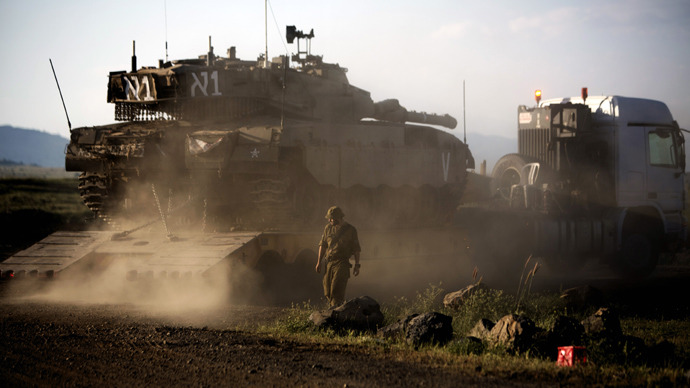‘Israel bombs Syria to psychologically pressure White House’

Israel’s recent airstrikes in Syria are an attempt to redefine Washington’s redlines against both Damascus and Tehran, in a high stakes political game that risks all-out regional war, Alastair Crook, a former EU mediator in the Middle East, told RT.
RT:Unprovoked, Israel has bombed Syria twice in 48 hours - where does international law stand on this issue?
Alastair Crook: Well that’s a very simple question: that’s clearly an act of war. I mean there’s no doubt about that, it was an unprovoked attack on a sovereign state and of course it is counter to the UN charter as well. It’s also an extremely dangerous exercise in doing this. However...it’s becoming a little bit clearer in Lebanon – from certain reporting’s we hear both from Hezbollah and Syria – that actually what we’re seeing is really more of a political event than necessarily a military one. In the sense that Hezbollah said earlier that there was an attempt by Israel to attack arms shipments coming from Syria, hence the Friday attacks.
Then, [Hezbollah seems to] confirm that actually there was a recent, successful receipt of what they describe as effective weapons. And then we had a number of over-flights into Lebanon over the weekend. So what I think we saw is the failure to actually hit the arms convoy probably provoked the Israeli’s to decide to make a demonstrative exercise in Damascus. [It was] if you like, a fireworks, a pyrotechnics exercise to make the point that they were unhappy about weapons shipments coming to Hezbollah.
RT:Given that Syria has strong regional allies like Lebanon and Iran, isn't Israel afraid of provoking a regional war?
AC: I think that Israel is playing quite a careful game, not necessarily wanting to go to war with Syria. But much of what its action is designed to do is to try and push Washington towards intervention in Syria. I think this is intended to put pressure not so much directly on the White House, but through Congress to change [Obama’s] red line. His red line being, he would only take action if chemical weapons were used in Syria. But also then, if the Israeli’s can shift that red line and push in for intervention, then maybe they can also create the atmosphere in Washington to push also for a change towards an attack on Iran. So I think ultimately, it’s much more a psychological exercise aimed at Washington than really a desire to start a multi-front war involving Syria, Hezbollah Iran and possibly other states.
RT:Now that Syrian missiles have reportedly been pointed at Israel - do you see this tension evolving into a military conflict?
AC: I think it’s very possible that it could evolve in
that way. It’s a highly dangerous exercise because I think we’re
approaching both the red lines of states such as Iran, Syria and
Russia, and on the other hand, the red lines of the United States.
I think that we have seen the timing of this as having been very
significant as it comes on the heels of really some notable
successes by President Assad’s forces on the ground both in the
south, around Homs – severing the link between Lebanon and Homs –
and indeed in the north. So in a sense, there’s probably an element
of this in a desire by Israel to give an extra push towards the
armed opposition in Syria. But there’s also the red line that we’re
going to see with Iran.
The statements, views and opinions expressed in this column are solely those of the author and do not necessarily represent those of RT.












